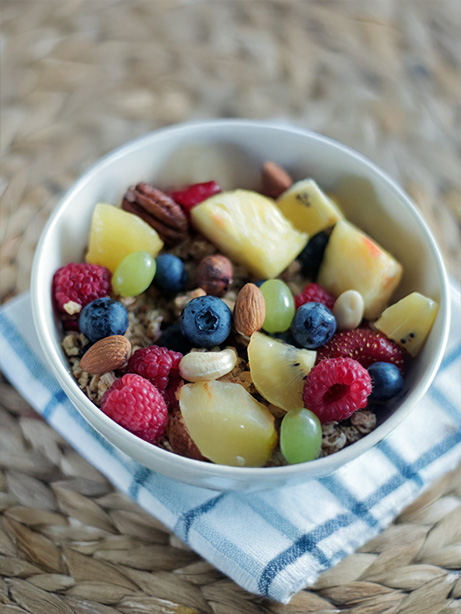

The sweet lie: where sugar is hidden even though it says “healthy”
Michaela Altenberger,
Sugar is the new smoking - except that we consume it voluntarily and believe we are doing something good for ourselves. The scandal? The food industry has managed to sell us sugar bombs as wellness products. Time for a reality check.
The big game of hide-and-seek begins on the supermarket shelf
Smoothies are considered healthy, right? A 250ml bottle can contain up to 25 grams of sugar - that's six teaspoons. For comparison: the WHO recommends a maximum of 25 grams of sugar per day for adults. With a “healthy” smoothie, the daily limit has already been reached before breakfast has even been eaten.
Muesli bars are another classic. They are advertised with images of oatmeal and nuts, but often contain more sugar than a chocolate bar. An average muesli bar contains 8-12 grams of sugar - disguised as “natural sweetness” from honey or agave syrup. Spoiler: Sugar remains sugar, regardless of whether it comes from sugar beet or agave.
The wellness trap: concrete examples from the chiller cabinet
- Actimel advertises itself as a healthy start to the day - for the immune system and digestion. In fact, 100ml of the classic drink contains 10.8 grams of sugar. That's the equivalent of four sugar cubes in a tiny bottle. If you drink two of them in the morning, you have already consumed half the recommended daily dose of sugar.
- Fruit dwarfs are considered a healthy snack for children. After all, it does contain fruit, right? The reality: 100 grams of the banana, strawberry or apricot variety contain 10.4 grams of sugar - that's over three sugar cubes. A single cup weighs around 50 grams, so it still contains more than one and a half sugar cubes.
- Dr. Oetker Vitalis crunchy muesli with honey promises a vital start to the day. With 25.8 grams of sugar per 100 grams, a normal bowl of muesli (around 50 grams) is equivalent to more than three sugar cubes - and that's before the milk.
- Belvita breakfast cookies are marketed as a balanced start to the day - with whole grains and long-lasting energy. The truth: 100 grams contain 15 grams of sugar, the equivalent of five sugar cubes. A packet usually weighs around 50 grams, which is still two and a half sugar cubes for breakfast.


The gut-brain axis suffers too
This is where it gets interesting for anyone interested in Neuro Longevity: Sugar is not only bad for your figure, it also actively sabotages communication between the gut and brain. Too much sugar feeds the wrong bacteria in the microbiome, crowds out the good ones and leads to inflammation.
The result? Tiredness, lack of concentration, mood swings. The 90 percent of serotonin produced in the gut can no longer do its job properly. It's no wonder that after the supposedly healthy breakfast at 11 a.m., you get the munchies again.
Deciphering the ingredients list
The food industry is creative when it comes to hiding sugar. Here are the most common disguises:

- Agave syrup
- Maple syrup
- Coconut blossom sugar
- Rice syrup
- Barley malt extract, fructose, glucose, sucrose, dextrose, corn syrup - all the same in green.
If one of these words is in the first five ingredients, it is a sugar product.
Products with several types of sugar are particularly tricky. This means that each individual ingredient slips further down the list of ingredients, even though sugar is the main ingredient when added together.
What to do? Be honest with yourself
Nobody has to give up sweet snacks and drinks completely. But it's worth stopping convincing yourself that they are healthy. If you eat sweets, then be aware of them for what they are: a sweet.
The following applies to everyday life: read ingredient lists, don't believe marketing promises. Cook or bake yourself where possible. And choose ready-made products with less than 5 grams of sugar per 100 grams.
Healthy alternatives that really work
- Instead of Actimel: natural yoghurt with live cultures, a few berries and a teaspoon of linseed oil. Or kefir pure - contains more probiotic bacteria and no added sugar.
- Instead of fruit dwarfs: Greek yoghurt with pureed fresh fruit. If you need it sweeter: mix in a mashed ripe banana.
- Instead of crunchy muesli: oat flakes with chopped nuts, seeds and fresh berries. Homemade granola with nuts and a teaspoon of honey for the whole portion.
- Instead of breakfast cookies: wholemeal bread with nut butter or avocado. Or homemade oat cookies with banana as the only sweetener.


The best news at the end: real foods - vegetables, nuts, fish, eggs - don't need long supplements or ingredient lists. They are what they are. And that's quite enough.

